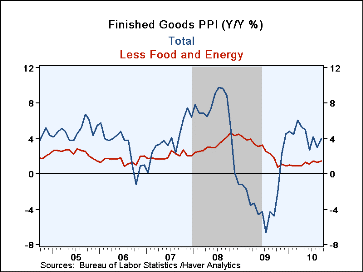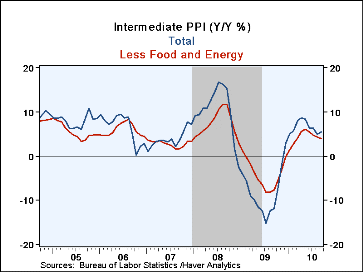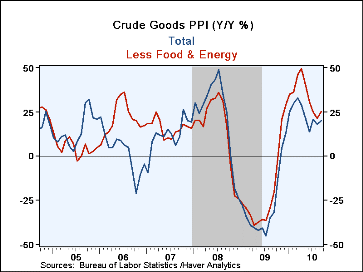 Global| Oct 14 2010
Global| Oct 14 2010U.S. PPI Jumps With Higher Food Prices; Core Prices Remain Tame
by:Tom Moeller
|in:Economy in Brief
Summary
The U.S. Producer Price Index for finished goods again turned in a strong performance last month. The 0.4% increase repeated its August gain and left the y/y comparison at 4.0%, about where it's been this all year. The monthly rise [...]
 The U.S. Producer Price Index for finished goods again
turned in a strong performance last month. The 0.4%
increase repeated its August gain and left the y/y
comparison at 4.0%, about where it's been this all year. The monthly rise was
double Consensus expectation. Higher food prices, and
before that higher energy prices, have led recently
monthly increases. These have not, however, yet flowed
through to core pricing power. The PPI less food & energy inched up an
expected 0.1%. The y/y gain, however, improved to 1.5% due
to the comparison to declining prices one year ago.
The U.S. Producer Price Index for finished goods again
turned in a strong performance last month. The 0.4%
increase repeated its August gain and left the y/y
comparison at 4.0%, about where it's been this all year. The monthly rise was
double Consensus expectation. Higher food prices, and
before that higher energy prices, have led recently
monthly increases. These have not, however, yet flowed
through to core pricing power. The PPI less food & energy inched up an
expected 0.1%. The y/y gain, however, improved to 1.5% due
to the comparison to declining prices one year ago.
Food prices were notably strong last month as a 1.2% increase was the largest since March. It was driven by sharply higher prices for meat and dairy products. Further strength in energy prices also drove last month's PPI as higher prices for electric power (5.3% y/y) offset monthly declines elsewhere.
Core finished consumer goods prices continued tame and posted another 0.1% increase (1.5% y/y). The 12-month gain remained down sharply due to declines in apparel prices as well as lower prices for appliances (-0.3% y/y) as well as passenger cars (-1.3% y/y). Furniture (1.1% y/y) and carpeting (0.6% y/y) prices have been relatively strong. Capital equipment prices posted a second 0.1% monthly increase (0.7% y/y).
Intermediate goods pricing power again improved slightly with a 0.5% increase. The 5.5% 12-month gain was, however, off its April high of 8.7%. Intermediate energy prices rose 0.7% and the y/y gain improved to 11.4%. That improvement was accompanied by an accelerated 5.2% y/y increase in food prices and a modest 0.2% gain (3.9% y/y) in core-intermediate prices. Crude goods pricing deteriorated after its recent strength due to an 8.8% decline in energy prices (14.4% y/y). Crude food prices jumped 5.0% (23.7% y/y). Continuing to reflect strength in the industrial sector, core crude prices posted a 5.5% (25.3% y/y) jump that was led by strong copper scrap prices (23.8% y/y) and higher iron & steel scrap prices (33.9% y/y).
The PPI data are contained in Haver's USECON database, with further detail in PPI and PPIR.
Macroprudential Supervision and Monetary Policy in the Post-crisis World is the title of Monday's speech by Federal Reserve Vice Chairman Janet L. Yellen to the National Association for Business Economics and it can be found here.
| Producer Price Index (%) | September | August | July | Year Ago | 2009 | 2008 | 2007 |
|---|---|---|---|---|---|---|---|
| Finished Goods | 0.4 | 0.4 | 0.2 | 4.0 | -2.5 | 6.4 | 3.9 |
| Energy | 0.5 | 2.2 | -0.9 | 10.3 | -17.6 | 14.1 | 6.8 |
| Food | 1.2 | -0.3 | 0.7 | 5.0 | -1.4 | 6.8 | 6.6 |
| Less Food & Energy | 0.1 | 0.1 | 0.3 | 1.5 | 2.6 | 3.4 | 2.0 |
| Intermediate Goods | 0.5 | 0.3 | -0.4 | 5.5 | -8.4 | 10.3 | 4.0 |
| Less Food & Energy | 0.2 | 0.1 | -0.4 | 3.9 | -4.2 | 7.4 | 2.8 |
| Crude Materials | -0.5 | 2.3 | 2.7 | 20.2 | -30.3 | 21.4 | 11.9 |
| Less Food & Energy | 5.5 | 4.1 | -1.4 | 25.3 | -23.5 | 14.8 | 15.6 |
Tom Moeller
AuthorMore in Author Profile »Prior to joining Haver Analytics in 2000, Mr. Moeller worked as the Economist at Chancellor Capital Management from 1985 to 1999. There, he developed comprehensive economic forecasts and interpreted economic data for equity and fixed income portfolio managers. Also at Chancellor, Mr. Moeller worked as an equity analyst and was responsible for researching and rating companies in the economically sensitive automobile and housing industries for investment in Chancellor’s equity portfolio. Prior to joining Chancellor, Mr. Moeller was an Economist at Citibank from 1979 to 1984. He also analyzed pricing behavior in the metals industry for the Council on Wage and Price Stability in Washington, D.C. In 1999, Mr. Moeller received the award for most accurate forecast from the Forecasters' Club of New York. From 1990 to 1992 he was President of the New York Association for Business Economists. Mr. Moeller earned an M.B.A. in Finance from Fordham University, where he graduated in 1987. He holds a Bachelor of Arts in Economics from George Washington University.
More Economy in Brief
 Global| Feb 05 2026
Global| Feb 05 2026Charts of the Week: Balanced Policy, Resilient Data and AI Narratives
by:Andrew Cates








